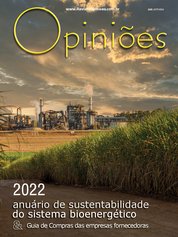Mara Pinheiro
Diretora de Comunicação e Relações Institucionais da BP Bunge Bioenergia
AsAA22
A agenda sustentável é determinante para o setor sucroenergético
O desenvolvimento sustentável é elemento direcionador para o agronegócio. Do planejamento à prática, a sustentabilidade deve estar presente de forma cada vez mais transversal. Atuar com menor pegada ambiental, por meio de boas práticas e tecnologia, é uma demanda da sociedade, seja de quem consome, investe ou produz.
A preocupação com o tema, com discussões desde os anos 1970, se junta, hoje, à maneira como as empresas produzem. O cultivo da cana-de-açúcar, que em mais de 500 anos representa uma importante contribuição econômica, política e social, é um dos que mais evolui na promoção, sobretudo, da sustentabilidade.
Para isso, o aprimoramento contínuo da operação é elementar na esteira da preocupação com a agenda ambiental e com práticas ESG (Ambiental, Social e de Governança). Do uso consciente de recursos ao reaproveitamento de resíduos, da gestão de recursos hídricos à proteção da biodiversidade, da prevenção a incêndios à redução de emissões.
Na BP Bunge Bioenergia, uma das maiores processadoras de cana-de-açúcar do Brasil, as 11 unidades atuam por um menor impacto ambiental possível, fomentando o desenvolvimento das comunidades e com ênfase na transição energética. Um futuro de energia limpa e processos produtivos mais sustentáveis são compromissos da empresa com a sociedade.
Em 2021, a companhia divulgou a agenda “Nossos Compromissos 2030”. Formatada conforme a estratégia da empresa e em sintonia com os Objetivos de Desenvolvimento Sustentável (ODS) da ONU, estabelece ações voltadas a mudanças climáticas, eficiência energética, biodiversidade, capital humano e desenvolvimento econômico. São metas como reduzir em 10% as emissões de gases de efeito estufa na produção de etanol, reduzir em 10% a água de uso industrial captada e plantar 2,3 milhões de mudas de espécies nativas.
Outro passo importante, em 2022, foi a adesão ao Pacto Global da ONU, que estimula um mercado global mais sustentável. A BP Bunge Bioenergia tem ainda um Comitê de Sustentabilidade multidisciplinar, de caráter permanente, para gestão das atividades e iniciativas ligadas ao tema.
No Relatório de Sustentabilidade 2021/22, indicadores da empresa refletem um processo evolutivo mais sustentável. O percentual de resíduos gerados reutilizados e/ou reciclados foi de cerca de 86%. O total de resíduos recuou 22% na comparação com a safra anterior. Na gestão da biodiversidade, 365 mil mudas nativas foram plantadas em Áreas de Preservação Permanente e Reserva Legal, 45% acima em relação a 2019/20.
Além disso, para minimizar impactos ambientais, a empresa tem um programa de prevenção e combate a incêndios, com uso de tecnologia. Na detecção, conta com monitoramento via satélite e, recentemente, passou a utilizar câmeras de alta definição em Pedro Afonso (TO), Itumbiara (GO) e Ituiutaba (MG). Em 2024, todas as unidades terão o sistema de detecção por câmeras.
A cana-de-açúcar é uma cultura fantástica e tem grande potencial de uso sustentável, principalmente a partir de seus subprodutos, reforçando o conceito de economia circular. A vinhaça é um dos mais conhecidos. Na BP Bunge Bioenergia, ela é utilizada para adubação do solo, aplicada de forma localizada, presente em 65% dos 300 mil hectares próprios da companhia, e ainda como fertirrigação, feita por aspersão.
Contudo a aderência a compromissos sustentáveis é um dever coletivo que envolve também parceiros e fornecedores. É papel do setor sucroenergético engajar e influenciar positivamente a operação para assegurar que a sustentabilidade esteja presente em todas as iniciativas. Na BP Bunge Bioenergia, 100% dos novos fornecedores são selecionados com base em critérios socioambientais.
O setor sucroenergético está na vanguarda da sustentabilidade. A atividade é estratégica do ponto de vista de segurança alimentar, ao produzir açúcar, e destaque na transição energética, a partir da bioenergia (etanol e energia elétrica de biomassa), como caminho para uma economia de baixo carbono, um desafio diante do crescimento populacional e do aumento da demanda por alimentos.
Compreender esse cenário é fundamental para a criação de valor de longo prazo. Tecnologias limpas aliadas a um comprometimento ambiental, por meio de relação próxima às comunidades e de organismos socioambientais, serão determinantes para o desenvolvimento sustentável, um compromisso global e urgente.




